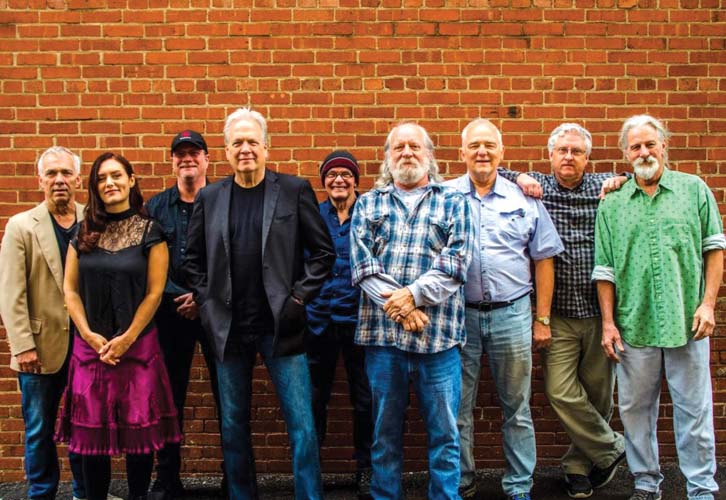
chesterfield | Is it country? Or rock? That’s been asked since at least 1969, when Crosby, Stills, Nash & Young played for the very first time together at Woodstock. Ozark Mountain Daredevils, founded in 1971, are coming to The Factory in Chesterfield at 7 p.m. Sept. 10, so you can decide for yourself. That is, if you haven’t already, which is a good thing, we think. Genre-bending is good for music, and these Daredevils—OMD, if you will—have been playing their own version of country-rock since about the same time as the Eagles, who you’ve also definitely heard on the radio, even if it was just playing overhead at the mall. The Eagles had their first hit in 1972 with “Take It Easy,” a real snoozer compared to “If You Wanna Get To Heaven,” a bona fide 1974 rave-up. Who knows how successful OMD could have been if they’d come from L.A. instead of Springfield, Missouri. Who cares? Well, perhaps one Mitchel Lee Smith, a friend of this reporter who was behind the OMD soundboard while he was in college and the band was just getting started. Maybe he’d have been a globetrotting sound man instead of an insurance broker. In any case, opening for OMD is Pat Liston, a cofounder of Mama’s Pride. It’s not all about the 1970s though, we realize. OMD released its latest album in 1997, and all of its output was reissued in the Aughts. Somebody’s listening … why not you? Visit thefactorystl.com.
kirkwood
We’re highlighting not one, but two, children’s books. And, since the author of one lives in Kirkwood, we could even go all corny and call it Kirkwood Kids Korner. Although tempted, we decided against it. Mike Kleckner of Kirkwood wrote a book that landed him in this column’s ‘Notable Neighbors’ section a couple years ago: Mike’s Unforgettable St. Louis History, Vol. 1. It was packed with arcane historical details from all over the metro. The idea for a second book came while Kleckner was tucking his son Teddy into bed two years ago. The little boy was 5 at the time.
Teddy: Daddy, Mommy said you made a book?
Kleckner: I did!
Teddy: Does your book have a lot of big photos and few words?
Kleckner: Not really.
Teddy: Well, the best books have a few words and lots of big photos.
Kleckner says it seemed like all of sudden a lightbulb clicked on right overhead! Mike’s Unforgettable St. Louis History, For Kids was published earlier this month. Teddy’s dad is very excited about the use of real-world historical photos in combination with unique, whimsical illustrations. The second kids’ book is about one man who means so much to the Lou that they even named the new Mississippi River bridge after him: Stephanie Bearce’s Stan Musial: From Donora, Pa., to St. Louis, Mo., and the Big Leagues. Stan Musial Veterans Memorial Bridge has been informally known as the ‘Stan Span’ since it opened in 2014. Having grown up in a poor coal town where his baseball was a rock covered in rags and electrical tape, Stan served in World War II and let neither his U.S. Navy uniform nor his Cardinals superstardom eclipse his humility. By the time his storied career ended in the 1960s, Musial held more MLB records than you could shake a Louisville Slugger at. Many stand to this day. For years, he kept his car trunk stocked with autographed baseballs on the good chance he’d come across fans wherever he was headed. By the way—with not too many words but lots of big photos, this book also will get Teddy Kleckner’s stamp of approval! Visit reedypress.com.
the metro
Classic 107.3 has produced a special program on Ukraine in its compelling series for schoolchildren. This episode of Musical Ancestries explores the splendor of Ukrainian culture through its music, dance, history and varied traditions. Musical Ancestries is designed to create a pathway to understanding as children explore the great diversity of the St. Louis community. Listeners will experience the beauty of Ukraine’s distinctive music and culture with young Veronika through the rich and engaging stories of her grandfather, Didus Ilya. Together they enjoy music played on unique instruments such as the bandura (pictured), thrilling dance, traditional foods and lively celebrations. Listeners can hear The Voice for the Arts in St. Louis in a variety of ways: It’s available at radio.com or tunein.com and the Classic 107.3 app, as well as the ‘old-fashioned way’ on your FM dial at 107.3. In addition to archived radio broadcasts, teachers, students and families can delve deeper and engage through the educational resources on Classic 107.3’s website. A user-friendly Prezi program incorporates visual images, maps, audio and video clips, and hands-on activities. Students can follow along with the broadcasts as they use the online materials or access the Musical Ancestries information anytime online. Visit classic1073.org/musical-ancestries-ukraine.
wash. u. school of medicine
In the late 1990s, my mother was in her mid-60s and recently retired as a sales consultant for a textbook publisher. She was studying for a doctorate and loved teaching children’s literature part-time at a small North Carolina college. But she seemed to be suffering from depression. Then, after student evaluations of her class came back overwhelmingly negative, she was not retained, and a neurologist suspected she was suffering from early-onset Alzheimer’s disease. She soon entered nursing care, and died of complications from the disease the night of June 17, 2002, one day after she turned 73. My family’s unfortunate outcome is suffered by more and more American families as the Baby Boom generation swells the Medicare rolls, and a Wash. U. Medical School professor of neurology is among those on interdisciplinary teams nationwide working diligently to turn the tide. Joy Snider, M.D., Ph.D., who has been working in the field for 30 years and has been clinical director of dozens of investigational drug trials here and prior to that, in Dallas, where she completed medical school, says there is light at the end of the tunnel. Drugs under development to slow or delay the progress of the disease are promising, one of which the FDA fast-tracked and approved in January: lecanemab. Research and development might set a company back $1 billion, with no guarantee a medication will ever reach the market—what’s more, in today’s uncertain regulatory environment, FDA approval may come very late or not at all. But that’s only if the process gets that far. “The drug companies could have bailed out after all this time,” says Snider, adding, with gratitude: “They didn’t.” The FDA has set a date of July 6 to decide on full approval of Leqembi, pharma companies Eisai and Biogen’s brand of lecanemab. Then, Medicare has promised to broadly cover Leqembi if the FDA grants full approval of the treatment. The price is steep, if not prohibitive. Plus, the uncertainty of government oversight and/or interference can be a source of frustration for Snider and her ilk. “This is one of those things that should be beyond politics,” Snider says. But with a first name like Joy, a layperson might tend to attach a connotation to a definition. In Snider’s case, that really wouldn’t be off base. “Neurologists are a pretty enthusiastic group,” she says, then offers a description that could serve (again, to a layperson) as a diagnosis: “We’re pathological optimists.” There’s much to be optimistic about, reports indicate: Data from a late-stage trial showed Leqembi slowed clinical and functional decline by 27% compared with a placebo at 18 months. And the data indicated that the drug doesn’t just treat symptoms of Alzheimer’s, like other available therapies do, but also changes the course of the disease. At some point in her career, Snider realized that research results would not bear fruit after a sprint, or even a marathon. This has been more like an Ironman triathlon. For more, visit knightalzheimertrials.wustl.edu.
